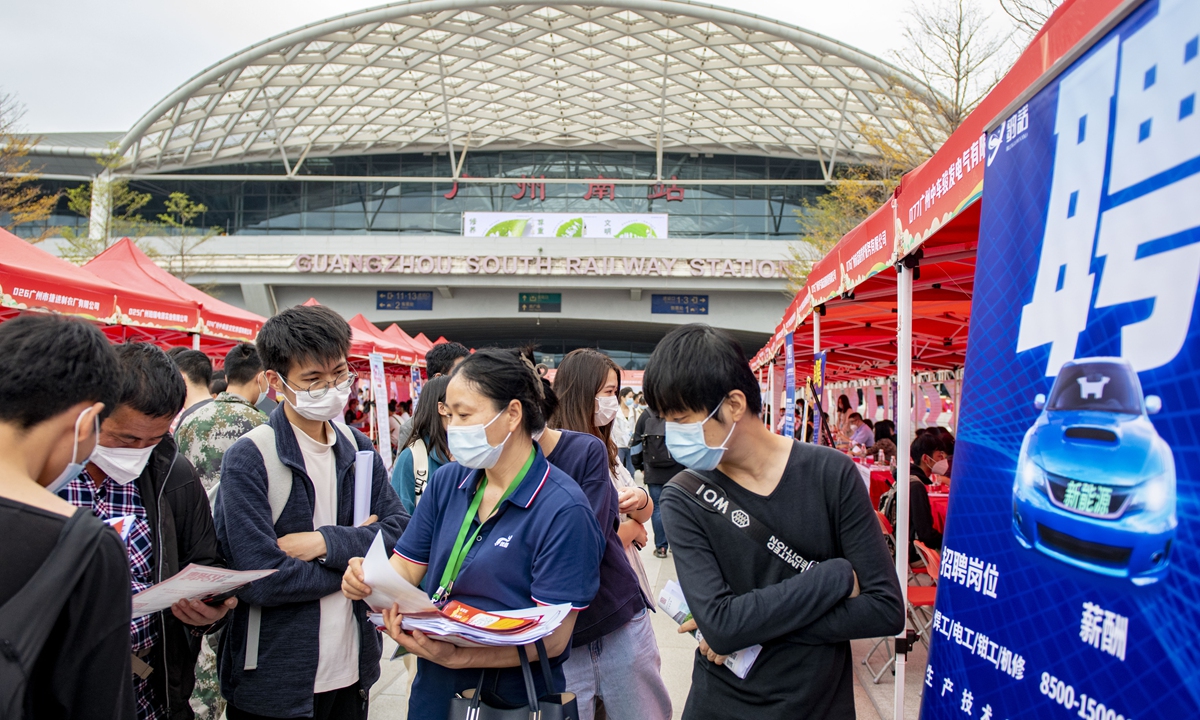
Job-seekers attend a large-scale job fair in Guangzhou, capital of South China's Guangdong Province on February 13, 2023. The local government will organize more than 200 high-quality job fairs in February, as factories face a dire need for skilled workers to ramp up production after the Spring Festival holidays. Photo: VCG
China has set a goal to create about 12 million new urban jobs this year, up from last year's target of 11 million, and keep the urban surveyed unemployment rate at about 5.5 percent, with a focus on youth employment, according to the Government Work Report delivered at the first session of the 14th National People's Congress on Sunday.
This year's overall job situation is poised to be better than last year, after China optimized its COVID-19 approach and the economy showed signs of bouncing back quickly, experts said.
Given that this year's economic situation should be more optimistic than in the past three years, the goal is well-founded and within the range of targets that can be reached, Li Changan, a professor at the University of International Business and Economics, told the Global Times on Sunday.
In 2022, overall employment remained stable despite the challenges of the epidemic, according to the report.
A total of 12.06 million urban jobs were added last year, exceeding the target, with the year-end surveyed urban unemployment rate falling to 5.5 percent.
Fiscal, taxation, financial and investment policies were implemented to curb the unemployment rate, which once saw a notable increase. The country also postponed the payment of social insurance premiums by enterprises in distressed sectors, significantly increased the proportion of unemployment insurance funds returned to enterprises to keep payrolls stable, and raised subsidies for stabilizing and increasing employment, according to the report.
This year, Li said that the services industry would have the strongest ability to absorb labors after emerging from the shock of COVID-19. Another source would be emerging industries, including high-tech industries, whose growth has outpaced the overall GDP growth rate.
In the first two months of 2023, the job market was stable and better than expected, with an early kickoff in company hiring and production activities, said Minister of Human Resources and Social Security Wang Xiaoping on Friday.
By the end of February, 46,000 recruitment events had been held and 32 million jobs had been posted, according to the ministry data.
To effectively ensure people's basic wellbeing, China will take concrete measures to fully implement the employment-first policy and place a higher priority on promoting the employment of young people, particularly college graduates, according to the report.
In 2023, the number of college graduates in China will reach 11.58 million. The structural problem of difficulty in recruiting people and finding jobs is still prominent, and there is a shortage of skilled workers, said Wang.
Next, the ministry will step up efforts to provide policy dividends to the services industry and private sector, which create a large number of jobs, help colleague graduates and young people find jobs or start businesses, and provide employment assistance and living allowances for those living in difficulties.
Global Times




